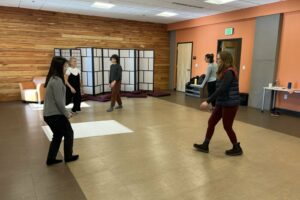
Julie Poehlmann-Tynan, the Dorothy O’Brien Professor in Human Ecology at the University of Wisconsin–Madison and faculty member with the Center for Healthy Minds and the Institute for Research on Poverty, along with co-editor Dr. J. Mark Eddy, Senior Research Scientist with New York University, have published an update to their groundbreaking book, Handbook on Children with Incarcerated Parents: Research, Policy, and Practice. The updated guide for researchers and practitioners working with children with incarcerated parents comes after nearly a decade of expanding research.
“I’m eager to get this new edition out into the world, as the research on children with incarcerated parents has exploded in the past 10 years,” says Poehlmann-Tynan. “Whether a child is experiencing her first visit to a parent in jail or is detained on the US–Mexico border, separated from her parents and fearing their deportation, I anticipate this book will help us serve our children and families better—everyone from policymakers to frontline social workers.”
"Whether a child is experiencing her first visit to a parent in jail or is detained on the US–Mexico border, separated from her parents and fearing their deportation, I anticipate this book will help us serve our children and families better—everyone from policymakers to frontline social workers."
This new handbook examines the family life, health and educational issues that often arise for the millions of children in the United States whose parents are involved with the criminal justice system, from arrest to prison or jail incarceration to reentry into the community. It details how children with incarcerated parents are more likely to exhibit behavior problems such as aggression, substance abuse, learning difficulties, mental health concerns and physical health issues than their peers. It also examines resilience and how children and families can thrive even in the face of multiple challenges related to parental incarceration.
“This important new volume provides a cutting-edge update of research on the impact of incarceration on family life. The book will be an essential reference for researchers and practitioners working at the intersections of criminal justice, poverty, and child development,” says Dr. Bruce Western, Professor at Columbia University and Co-Director of the school’s Justice Lab.
Chapters integrate the diverse, interdisciplinary, and rapidly expanding literature, and they synthesize rigorous scholarship to address the needs of children from multiple perspectives, including child welfare, child development, education, health care, mental health, family science, law enforcement, corrections and law. The handbook concludes with a chapter that explores new directions in research, policy and practice to improve the life chances of children with incarcerated parents.
Dr. Leslie Leve, an expert in child and adolescent development at the University of Oregon, says, “This edition is a ‘must-read’ for students, researchers, practitioners, and policy-makers alike who are dedicated to promoting the health and resilience of children affected by parental incarceration.”
Handbook on Children with Incarcerated Parents: Research, Policy, and Practice is available in hardcover and eBook versions from Springer.
-Adapted from an original article by Serena Larkin, School of Human Ecology at the University of Wisconsin–Madison






